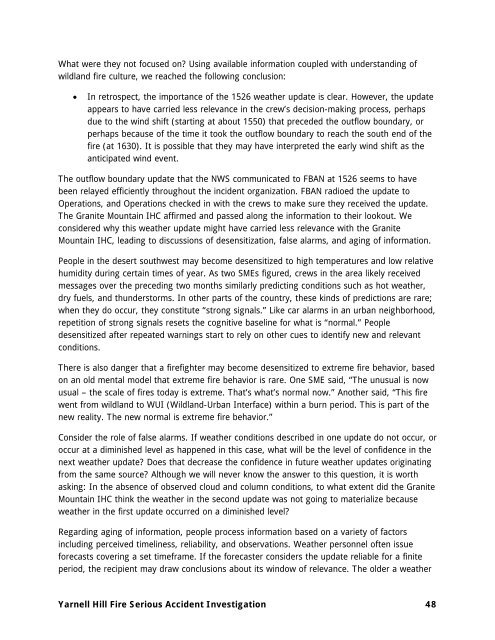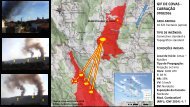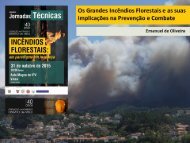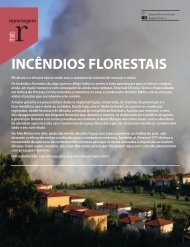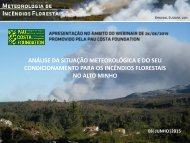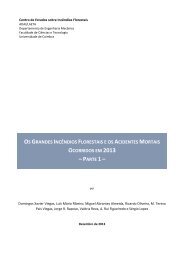Relatório do Acidente ocorrido no Incêndio Florestal de Yarnel Hill
Neste incêndio, de 30 de Junho de 2013, morreram 19 combatentes florestais da equipa "Hot Shot" de Granite Mountain.
Neste incêndio, de 30 de Junho de 2013, morreram 19 combatentes florestais da equipa "Hot Shot" de Granite Mountain.
You also want an ePaper? Increase the reach of your titles
YUMPU automatically turns print PDFs into web optimized ePapers that Google loves.
What were they <strong>no</strong>t focused on? Using available information coupled with un<strong>de</strong>rstanding of<br />
wildland fire culture, we reached the following conclusion:<br />
• In retrospect, the importance of the 1526 weather update is clear. However, the update<br />
appears to have carried less relevance in the crew’s <strong>de</strong>cision-making process, perhaps<br />
due to the wind shift (starting at about 1550) that prece<strong>de</strong>d the outflow boundary, or<br />
perhaps because of the time it took the outflow boundary to reach the south end of the<br />
fire (at 1630). It is possible that they may have interpreted the early wind shift as the<br />
anticipated wind event.<br />
The outflow boundary update that the NWS communicated to FBAN at 1526 seems to have<br />
been relayed efficiently throughout the inci<strong>de</strong>nt organization. FBAN radioed the update to<br />
Operations, and Operations checked in with the crews to make sure they received the update.<br />
The Granite Mountain IHC affirmed and passed along the information to their lookout. We<br />
consi<strong>de</strong>red why this weather update might have carried less relevance with the Granite<br />
Mountain IHC, leading to discussions of <strong>de</strong>sensitization, false alarms, and aging of information.<br />
People in the <strong>de</strong>sert southwest may become <strong>de</strong>sensitized to high temperatures and low relative<br />
humidity during certain times of year. As two SMEs figured, crews in the area likely received<br />
messages over the preceding two months similarly predicting conditions such as hot weather,<br />
dry fuels, and thun<strong>de</strong>rstorms. In other parts of the country, these kinds of predictions are rare;<br />
when they <strong>do</strong> occur, they constitute “strong signals.” Like car alarms in an urban neighborhood,<br />
repetition of strong signals resets the cognitive baseline for what is “<strong>no</strong>rmal.” People<br />
<strong>de</strong>sensitized after repeated warnings start to rely on other cues to i<strong>de</strong>ntify new and relevant<br />
conditions.<br />
There is also danger that a firefighter may become <strong>de</strong>sensitized to extreme fire behavior, based<br />
on an old mental mo<strong>de</strong>l that extreme fire behavior is rare. One SME said, “The unusual is <strong>no</strong>w<br />
usual – the scale of fires today is extreme. That’s what’s <strong>no</strong>rmal <strong>no</strong>w.” A<strong>no</strong>ther said, “This fire<br />
went from wildland to WUI (Wildland-Urban Interface) within a burn period. This is part of the<br />
new reality. The new <strong>no</strong>rmal is extreme fire behavior.”<br />
Consi<strong>de</strong>r the role of false alarms. If weather conditions <strong>de</strong>scribed in one update <strong>do</strong> <strong>no</strong>t occur, or<br />
occur at a diminished level as happened in this case, what will be the level of confi<strong>de</strong>nce in the<br />
next weather update? Does that <strong>de</strong>crease the confi<strong>de</strong>nce in future weather updates originating<br />
from the same source? Although we will never k<strong>no</strong>w the answer to this question, it is worth<br />
asking: In the absence of observed cloud and column conditions, to what extent did the Granite<br />
Mountain IHC think the weather in the second update was <strong>no</strong>t going to materialize because<br />
weather in the first update occurred on a diminished level?<br />
Regarding aging of information, people process information based on a variety of factors<br />
including perceived timeliness, reliability, and observations. Weather personnel often issue<br />
forecasts covering a set timeframe. If the forecaster consi<strong>de</strong>rs the update reliable for a finite<br />
period, the recipient may draw conclusions about its win<strong>do</strong>w of relevance. The ol<strong>de</strong>r a weather<br />
<strong>Yarnel</strong>l <strong>Hill</strong> Fire Serious Acci<strong>de</strong>nt Investigation 48


